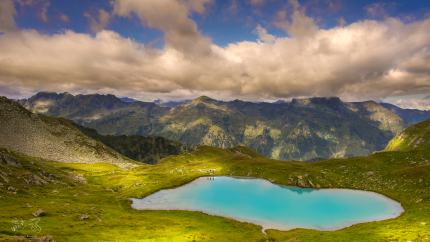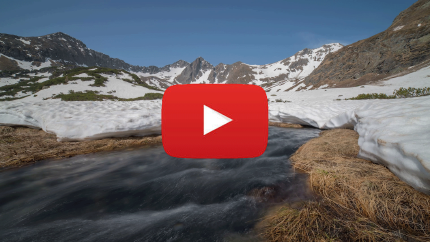Sölktäler Nature Park
Country: Austria.
Established in: 1982.
Surface area: ca. 28.800 ha.
Municipalities: Community of Sölk including Stein an der Enns, Großsölk, Fleiß, Mössna, St. Nikolai, Kleinsölk, Hinterwald.
Main features: comprehensive visitor stream management and education of locals to increase awareness of the region and to be able to relay this knowledge to visitors (workshops).
Discover the Park!
Park Description:
Sölkpass is the highest pass in the province of Styria with 1788m. Through the pass road the area around the Sölkpass is easily accessible. The attractive landscape with mountain lakes, a wonderful plant world and wonderful hiking destinations has a high attractiveness for hikers in summer. In winter this area offers several very attractive backcountry skiing tours.

Seekarlsee Lake - Photo by Paradies Ennstal
Nature park Sölktäler is situated in the Lower Tauern massif. The whole park covers 28.800 ha and stretches out from 694 in valley Ennstal up to 2747 meters above sea level. Most of the mountains are extremely steep and not easy to cultivate. The forest line lays about approx. 1800 – 1900 m height. Lots of alpine meadows lower than this line bring a mosaic of different habitats in small spaces. These regions have the highest abundance of species. There are different rock materials, being the reason why there is so much biodiversity of vegetation. Through mainly old rocks a band of marble extends across the two valleys and enriches the vegetation. Distinguishing of the Naturpark Sölktäler is the swampy landscape and the numerous lakes in the different altitudes
There are two main parallel valleys. The eastern one has a pass, which leads to the southern regions of Tauern and the valley of Mur. The street is closed in winter; in summer lots of tourists use this possibility to cross the Alps. The former known “Säumerweg” was used to transport and exchange salt, wine and grain.The Sölkpass is one of the main reasons for the publicity of the Sölk valleys. The tourists are passing, see the beautiful landscape and the historic huts and stay for some hours.
Because of the rough climate the farmers only manage their woods and have cattle and sheep, which stay on the alpine meadows during summer. In the valleys there are no fields, only meadows. Most of them are only harvested two times. The alpine meadows are reserved for cattle feeding.
Naturpark Sölktäler does not have much tourism, more daily tourism for hiking in summer (alpine pastures and huts, which often can be reached by car) and a little group of ski tour - tourists in winter. Additionally there is the castle “Großsölk”, the house of the Nature Park with a permanent herbage garden exhibition and other temporary exhibitions. The castle is closed in winter. There are approximately 20.000 overnight stays during the whole year. This number is increasing lightly.
The area around the Sölkpass is the only nature reserve in the Sölktäler Nature Park. Sensitive use of this area is therefore of great importance. With regard to visitor guidance, the hunting interests must be taken into account. In addition to the Sölkpass, the Schwarzensee in the Kleinsölk Valley is one of the tourist hotspots of the Sölktäler Nature Park in summer. Naturally responsible visitor guidance is also important here.
The big goal of the Naturpark Sölktäler is to increasingly focus on quality rather than quantity. Together with the inhabitants the special habitat, flora and fauna should be presented. The awareness of nature should be awaked and increased.
CEETO Pilot Action Objectives:
The pilot aims to implement the common governance model inside the Sölktäler Nature Park, whos 2/3 consist of Natura 2000 network sites. Since its foundation SNP has a strong cooperation with local schools, touristic operators, farmers and or Natura 2000 sites a close collaboration with Province of Styria Nature Conservation department. The Park has a tourism association that is part of the tourism region Schladming-Dachstein, one of the strongest tourism regions.
Sölktäler Nature Park - CEETO Pilot Area video-presentation:
This video portrays the main natural features and tourism challenges that the Sölktäler Nature Park, Austria, is facing. With CEETO project, the Park will test and implement a system to tackle the existing challenges.

-Lupi-Spuma.png)
